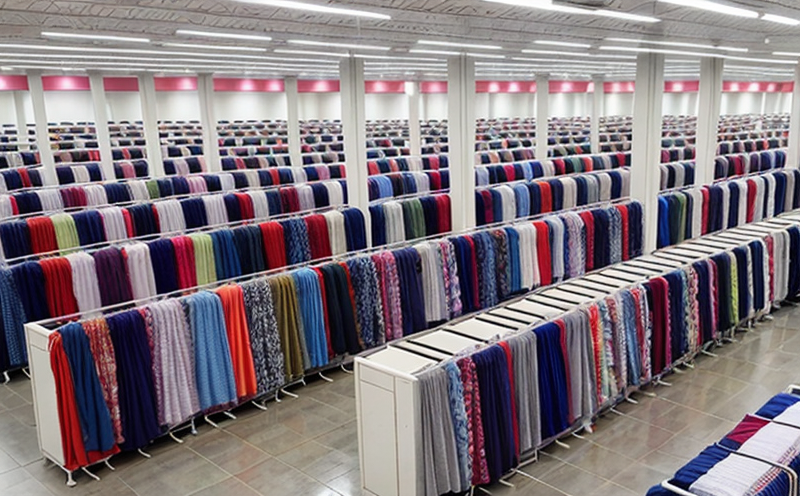ISO 3801 Mass per Unit Area Testing of Textile Exports
The ISO 3801 standard for determining mass per unit area, also known as grams per square meter (g/m²), is a critical test in the textile and apparel export industry. This measurement ensures that textiles meet specified weight requirements, which are crucial for consistent product quality, accurate pricing, and compliance with international trade standards.
Mass per unit area testing involves measuring the mass of a defined sample area of fabric, typically 1 m² or another size as specified by the standard. The test is performed on various types of textiles including woven fabrics, knitted fabrics, non-wovens, and technical textiles used in apparel, footwear, automotive interiors, and industrial applications.
The testing process involves cutting a sample from the fabric, placing it onto an analytical balance, and ensuring that the sample area aligns accurately with the instrument's measuring surface. The mass is then recorded after stabilizing for a set time to account for any environmental factors like humidity or temperature fluctuations.
This test plays a pivotal role in quality assurance processes, particularly for textiles intended for export markets where uniformity and compliance are paramount. By ensuring consistent mass per unit area, manufacturers can prevent discrepancies that could lead to non-compliance issues with international trade agreements, including the WTO's rules on technical barriers to trade.
The application of ISO 3801 is not limited to just exporting textiles but also ensures internal quality control processes and helps in meeting customer specifications. For instance, retailers may have specific mass per unit area requirements for their suppliers to maintain brand standards and ensure product consistency across different batches or production runs.
For R&D engineers, ISO 3801 testing can provide insights into the impact of fabric modifications on weight and structure. This information is valuable when developing new textile designs that need to meet both aesthetic and functional requirements while adhering to trade regulations.
The standard also supports procurement processes by ensuring that suppliers consistently deliver products within specified mass per unit area tolerances, thereby minimizing rejections and improving supply chain efficiency.
| Industry Applications |
|---|
| Apparel Manufacturing |
| Footwear and Leather Goods |
| Automotive Interiors |
| Technical Textiles |
| Medical Devices |
The standard is widely recognized for its precision and reliability, making it a preferred choice in the textile industry. Compliance with ISO 3801 not only ensures product quality but also enhances brand reputation and market credibility.
Industry Applications
The ISO 3801 standard finds extensive application across various sectors within the textile industry, including:
- Apparel Manufacturing: Ensuring that fabric cuts meet specific weight requirements for garments.
- Footwear and Leather Goods: Providing consistent material specifications for shoe soles or leather components.
- Automotive Interiors: Maintaining quality in seat fabrics, carpets, and other interior textiles.
- Technical Textiles: Guaranteeing performance characteristics of industrial textiles used in manufacturing processes.
- Medical Devices: Ensuring sterility and weight consistency for medical gloves or bandages.
These applications highlight the versatility and importance of ISO 3801 testing across diverse industries where textile quality is critical to product performance and compliance with international standards.
Why Choose This Test?
- Comprehensive Quality Assurance: ISO 3801 testing ensures that textiles meet specified mass per unit area requirements, thus maintaining product quality and consistency.
- Enhanced Market Access: Compliance with international standards like ISO 3801 opens doors to global markets, ensuring products can be exported without regulatory barriers.
- Customer Satisfaction: By providing accurate mass per unit area data, manufacturers can ensure that their products meet customer specifications and expectations.
- Avoidance of Non-Compliance Issues: Ensuring consistent weight in textiles helps avoid penalties or rejections due to non-compliance with trade agreements.
- Stakeholder Confidence: Compliance with international standards builds trust among customers, suppliers, and regulatory bodies.
- Innovation Support: Accurate mass per unit area data is essential for R&D teams to innovate and develop new textile products that meet market demands.
These benefits underscore the importance of ISO 3801 testing in maintaining high standards within the textile export industry.
Quality and Reliability Assurance
- Consistency Across Batches: ISO 3801 ensures that each batch of textiles maintains the same mass per unit area, leading to consistent product quality.
- Reproducibility: The standardized testing process allows for repeatable results, making it easier to track trends and identify variations in production processes.
- Error Reduction: By providing accurate measurements, ISO 3801 helps minimize errors in manufacturing and packaging processes.
- Long-Term Reliability: Ensuring consistent mass per unit area can lead to longer-lasting products that meet durability standards.
- Environmental Impact Assessment: Understanding the mass per unit area of textiles allows for better management of resource usage, contributing to sustainability goals.
The reliability and consistency offered by ISO 3801 testing are essential for maintaining high-quality standards in the textile export industry.





